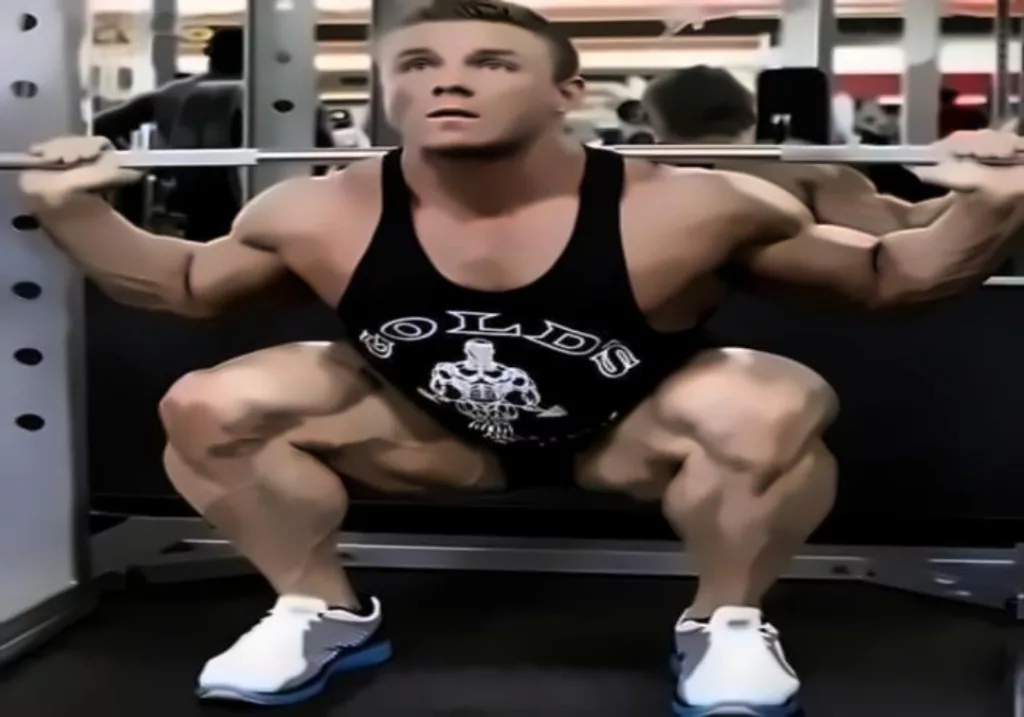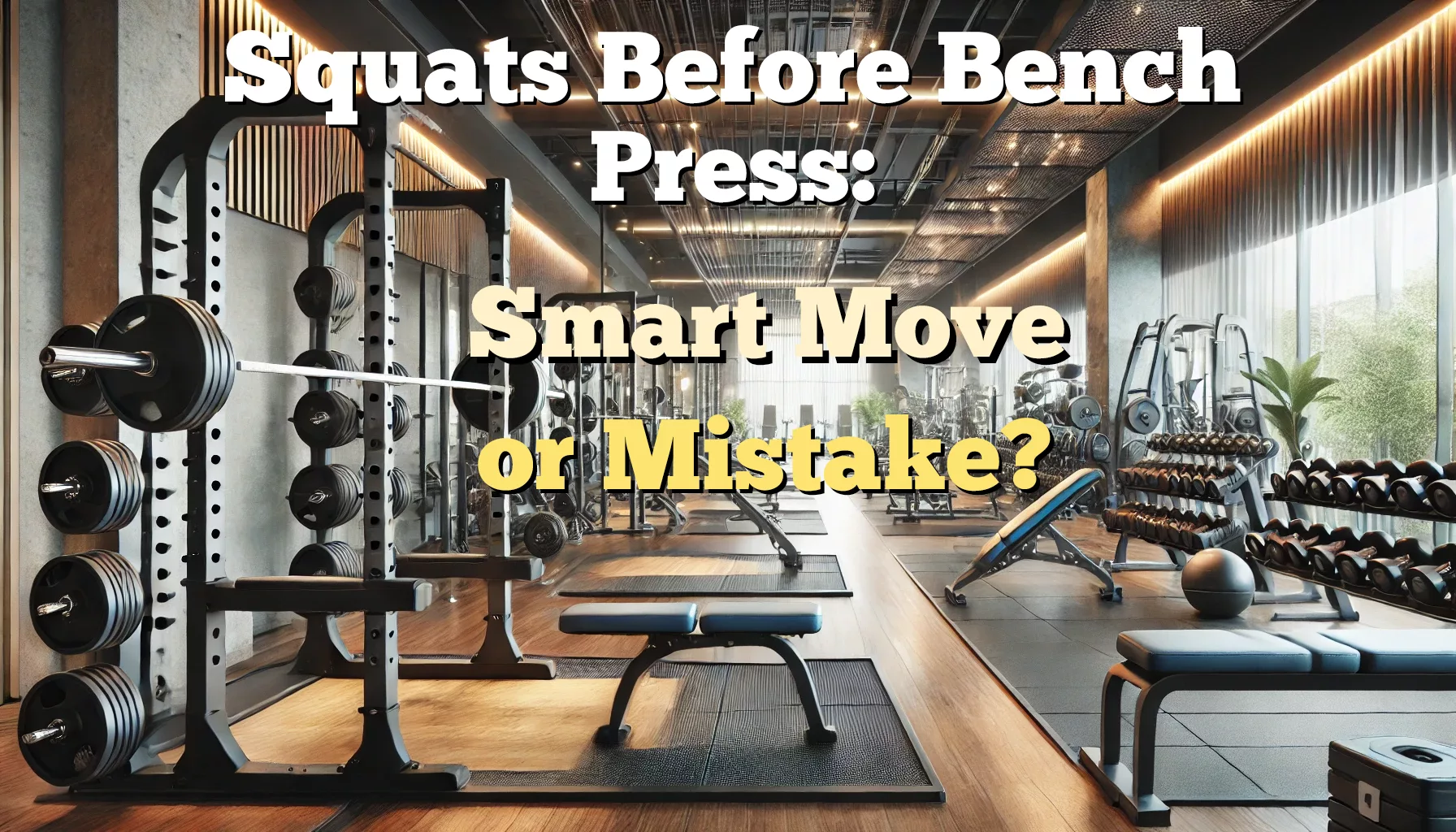Combining squats and bench press on the same day is a strategy that I have tested carefully.
I have never taken the benefits of this combination for granted.
I have learned that the effect depends greatly on energy management and the distribution of effort.
Both bench press and squats activate the nervous system, but the latter offer an extra advantage: they involve a greater number of muscle groups and warm up the entire body more completely.
This overall “wake-up” creates the ideal conditions for handling heavier loads on the bench press, giving that extra boost that can make a difference.
Naturally, this approach requires continuous experimentation and adjustments.
Squat: Activates All the Muscles

Squats are not just about legs.
They involve:
- core
- glutes
- back
- even the shoulders
When you start your workout with squats, you activate a multitude of muscles.
It’s like starting the engine of a supercar before setting off.
The central nervous system wakes up, ready to drive every muscle fiber.
This total warm-up is not just sensationalism.
There are studies that show an increase in anabolic hormones, such as testosterone and growth hormone.
Yes, precisely those powerful allies for increasing strength and muscle mass.
But be careful: this boost can vary from person to person.
The secret lies in the balance between activation and fatigue.
Bench Press: The Strength of the Upper Body

Moving on to the bench press, the workout becomes an explosion of power for the torso.
This exercise not only works the chest: it also engages the shoulders, triceps, and even the core, which acts as a stabilizer during every repetition.
When you perform a well-calibrated bench press, you feel that connection between mind and muscles, as if every fiber were ready to give its maximum.
The push from the upper body muscles, combined with the support of a solid base created by squats, allows you to handle heavier weights with greater confidence.
How Important Are Legs in a Bench Press?
In my fitness journey, I have learned that the legs are the true ace up your sleeve for an outstanding bench press.
It is not enough to only push with the upper body: the legs provide a robust base, essential for stability and strength.
The “leg drive” is that magical touch that allows you to lift weights that once seemed impossible, turning every repetition into a true power move.
Without engaging the legs, you risk losing balance, like a boat adrift.
I have personally found that training the legs with squats and other exercises makes a big difference in improving my bench press.
The Power of Squats for the Bench Press
When you start your session with squats, you are immediately hit by a surge of adrenaline, a ritual that makes you realize it is time to give your all.
This psychological boost not only makes you feel invincible, but also mentally prepares you for the bench press, where lifting upper body weights requires extra mental strength.
Certainly, every exercise – squats and bench press – contributes to your energy, but squats have the advantage of immediately activating your fighting spirit.
If you learn to properly gauge your effort and recognize your body’s signals, you can transform that initial surge into concrete results throughout the entire workout.
Scientific Data and Technical Curiosities
I am not just talking about sensations and adrenaline.
Science confirms that squats activate a wide range of muscles.
This leads to better neuromuscular coordination.
In practice, your muscles “communicate” better with each other.
The result?
Greater efficiency in transferring force during the bench press.
However, be careful:
If squats are too intense or prolonged, you might accumulate fatigue.
This could result in a decrease in bench press performance.
It is a matter of balancing the positive push with the risk of exhaustion.
Strategies to Maximize the Boost
So, what should you do if you want to make the most of squats before the bench press?
Dosage of Intensity:
- Do not overdo the load.
- If you are a beginner, start with moderate squats to “wake up” the body.
- If you are advanced, keep the intensity under control so as not to exhaust yourself.
Timing and Rest:
- Allow a short but sufficient rest interval between exercises.
- This way, the muscles have time to recover and remain ready for the bench press.
Program Personalization:
- Every body reacts differently.
- Try different combinations and listen to your body.
- The key is to experiment and adapt the routine to your needs.
Squat or Bench Press: Which Order to Choose?
Speaking in the first person, I remember the times when I tested this technique.
Sometimes, after a well-dosed squat session, the bench press seemed easier: the bar slid smoothly and the repetitions went well, making me feel confident.
But I confess that there were many occasions when, after pushing too hard on the squats, I already felt quite tired, and this also affected the bench press.
However, everyone experiences these sensations differently, so I advise you to experiment to discover what works best for you.
| Therefore, there is no universal rule that says “always do squats before the bench press.”
For some, this strategy works great; for others, it can be counterproductive. The fatigue accumulated from intense squats could compromise bench press strength. This is the flip side of the coin. So, if your main goal is to improve the bench press, you might need to separate the sessions or modulate the intensity of the squats. |
RELATED:》》》 Will Relying Solely on Squats and Bench Press Deliver a Massive Physique?
Conclusion
In conclusion, incorporating squats before the bench press can give you an extra gear.
This technique activates your body, stimulates the nervous system, and prepares you mentally.
However, as in everything in fitness, balance is essential.
Do not overdo it and always listen to your body.
Experiment and learn from your workouts.
Every gym session is a new opportunity to improve and grow.
Remember: the road to success is paved with attempts, mistakes, and above all, passion.
Tell me in the comments which exercise you prefer to do first and how you feel!
FAQs
How long should the rest period be between squats and bench press?
A short interval, from 1 to 3 minutes, may be sufficient for some, but experiment to find the time that allows you to recover without losing your momentum.
What long-term benefits can I expect from this strategy?
In addition to improving overall strength, you might notice an increase in neuromuscular coordination and greater efficiency in transferring force between exercises.
Is it useful to vary the order of exercises depending on the workout?
Yes, alternating the order can help stimulate different adaptations and prevent monotony in your training program.
Is combined training more suitable for advanced individuals, or can it work for beginners as well?
Even though beginners can benefit from it, it is important to start with moderate loads and focus on form first, then experiment with different orders as you progress.

